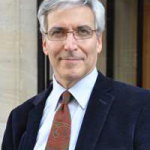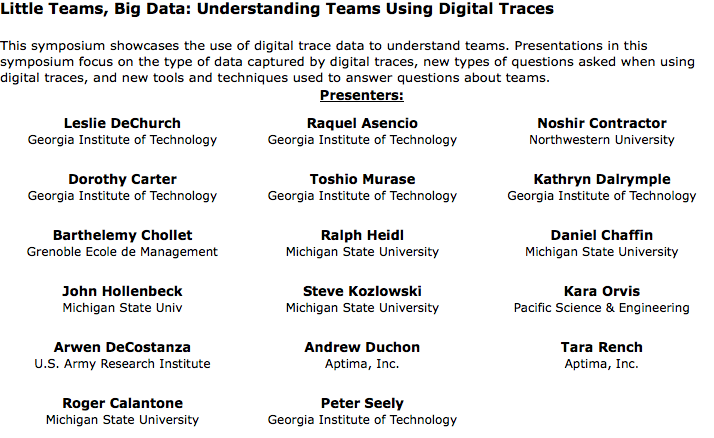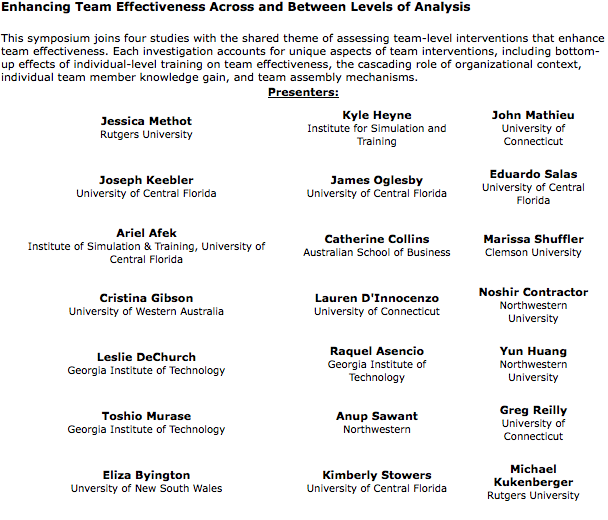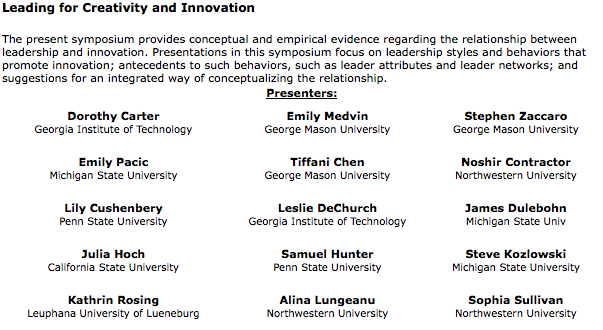Noshir Contractor participated in a symposium titled “Enhancing Team Effectiveness Across and Between Levels of Analysis” at the Society for Industrial & Organizational Psychology Annual Conference on May 15, 2014
Noshir Contractor participated in a symposium titled “Leading for Creativity and Innovation” at the Society for Industrial & Organizational Psychology Annual Conference on May 15, 2014
Noshir Contractor participated on a panel titled “Using Big Data to Advance Psychological Theory: Report From the NCI – Big Data for Theory Advancement” at the Association of Psychological Science annual conference on May 25, 2014
For more information, see here
Paper by Sophia Sullivan, Alina Lungeanu, Leslie DeChurch, and Noshir Contractor entitled “An Agent-Based Model (ABM) of the Emergence of Leadership for Innovation in Multiteam Systems,” was presented at the Society for Industrial and Organizational Psychology (SIOP) Annual Conference, Honolulu, HI
SONIC member Lindsay Young starting in August 2014 as post doctoral scholar at University of Chicago
Starting in August, Lindsay will be joining the Chicago Center for HIV Elimination (CCHE) at the University of Chicago as a Postdoctoral Scholar. Under the leadership of Dr. John Schneider (MD, MPH) CCHE is dedicated to eliminating HIV transmission by utilizing social, sexual and other risk networks to identify 1) pathways of HIV transmission; 2) how behavior and influence are transmitted through these same networks; and 3) how these networks can be leveraged for integrated prevention interventions. Lindsay will be engaging in research activities that include analysis of data from men having sex with men (MSM) networks and other network interventions in South Chicago and South India.
Noshir Contractor will be a co-Principle Investigator on a $8.7-million NIH grant titled “Multilevel Influences on HIV and Substance use in a YMSM Cohort”
This will be the largest comprehensive study of young men who sleep with men ( MSM ) recently launched. The multidisciplinary study will include psychologists, physicians, virologists, developmentalists, network scientists and statisticians from Northwestern University, Oxford University and the University of Edinburgh in Scotland. Dr. Brian Mustanski—director of the IMPACT LGBT Health and Development Program in the Feinberg School of Medicine at Northwestern University—will lead the study. For more, click here.
Emmanuel Lazega to present in the SONIC Speaker Series
 SONIC Lab is proud to welcome Emmanuel Lazega, who will present a talk on Tuesday, April 29, 2014 (9:00am) in SONIC Lab in the Frances Searle Building room 1.459. All are welcome to attend. To schedule a one-on-one meeting with a SONIC speaker please schedule a time at bit.ly/SonicSpeaker (april 28, from 10 am to 4 pm).
SONIC Lab is proud to welcome Emmanuel Lazega, who will present a talk on Tuesday, April 29, 2014 (9:00am) in SONIC Lab in the Frances Searle Building room 1.459. All are welcome to attend. To schedule a one-on-one meeting with a SONIC speaker please schedule a time at bit.ly/SonicSpeaker (april 28, from 10 am to 4 pm).
A Spinning Top Model of the Dynamics of Advice Networks
We argue that a spinning top model is a useful heuristic for intra-organizational learning in advice networks. This model proposes that a stabilized ‘elite’ shapes and preserves accumulated knowledge in an organization that overall experiences high turnover and systematic job rotation. We test the model by analysing the structure and dynamics of advice networks among 240 judges in a Commerical Court. Applying the model helps identify an endogenous process of increasing then decreasing centralization of the network over time. It raises questions about the maintenance and stability of its pecking order and about relationship between organizational learning in such an institution and joint regulation of markers.
About Emmanuel Lazega
Emmanuel Lazega is a professor of sociology at Sciences Po, Paris. He is a member of the editorial board of Social Networks. One of the focuses of his research is on collective learning in intra- and inter-organizational networks. In this area, he has published Micropolitics of Knowledge, New York, Aldine-de Gruyter (1992) and The Collegial Phenomenon, Oxford University Press (2001), as well as specialized papers theorizing collective learning based on empirical analyses, conducted with colleagues and doctoral students, of advice networks in various professional social settings. His publications can be found here: elazega.fr
Noshir Contractor presented SONIC research as part of the A. Watson Armour III Research Seminar Series at the Field Museum, Chicago on April 23, 2014
For more information click here.
SONIC was pleased to co-host 6th Annual International workshop on Network Theory
SONIC was pleased to co-host (with the ANN and NNSI) the 6th Annual International workshop on Network Theory in Los Angeles on April 10-12, 2014. The theme for this year’s workshop was Social Networks in Governmental and Nongovernmental Sectors.
The tweets and links to resources discussed can be found here.




